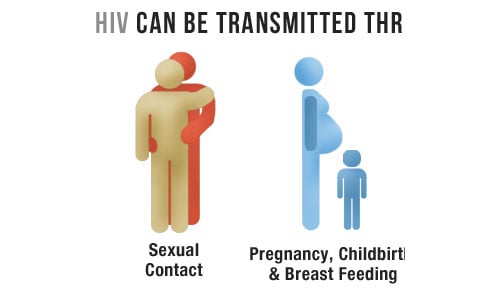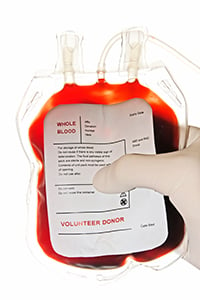Question & Answer: How Is HIV Transmitted?
Most of people misunderstand about AIDS and HIV. Some of them are accustomed to say AIDS infection that is wrong. The correct world is HIV Infection. Let’s learn “what is the difference between HIV and AIDS?”
HIV (Human immunodeficiency virus) is a virus that causes AIDS. Many people live for many years with HIV without symptoms.
AIDS is a set of symptoms caused by HIV. It attacks the immune system. A person’s immune system will get weaker and weaker until no longer fight off life-threatening infections and diseases.
The complications caused by AIDS may not result to death. People with HIV can enjoy a long life and control its by taking antiretroviral treatment which is effective and helps boost their immune system.
How do you catch HIV?
All bodily fluids contain dissimilar concentration of the virus:
- High concentration of the virus: blood, vaginal fluids, leucorrhea, menstrual blood, breast milk
- Low concentration of the virus: tear, saliva, snot, sputum
- Almost completely virus free: stools, urine, sweat
Why does each bodily fluid contain dissimilar concentration of the virus?
HIV cannot grow or reproduce on its own. Instead, the virus attached itself to white blood cell (T-helper cell) and fuses with it. Therefore, bodily fluids that contain white blood cell or blood have high concentration of the virus such as blood, vaginal fluids, leucorrhea, menstrual blood, pus. On the other hand, bodily fluids that do not contain blood or white blood cell have low concentration of the virus such as urine, stools and sweat.
How Long Does HIV Live Outside the Body?
Although HIV virus is a potent virus, it is very fragile. It does not service long outside the human body. In general, HIV will be inactive from few hours to a day, depended on environment. High temperature, dried environment, acid-base condition or sunshine commonly damages the HIV virus. However, under suitable environment, appropriate humidity or cold temperature (approximately 20 Celsius degree), HIV can survive for many days but not over a week.
Can HIV virus survive in animals?
Only human and monkey can be affected by HIV virus. HIV virus will not survive in animals such as dogs, cats, cows, buffalos or mosquitoes. In animals, HIV will be inactive in a short period. Therefore, if a mosquito bit HIV people, HIV virus will be inactive in a short time and will not transmit to other people.
How Is HIV Transmitted?
HIV is spread mainly by 3 major routes through:
- Blood, blood transfusion, sharing needles or syringes, using unsterile medical equipment with blood contaminated or open wound contact with blood or lymph of HIV infected people.
- Sexual transmission between male and female or male and male; having vaginal or anal or oral sex especially fellatio on penis of HIV infected people.
- Mother-to-child transmission (Vertical Transmission) is commonly the spread of HIV from woman with HIV to her child during childbirth. The transmission during pregnancy or breastfeeding is rare.

Which one takes a highest risk?

- Exactly, it is blood transfusion. The risk of HIV infected from receiving a whole pack of blood transfusion can range almost 100%. However, all packs of blood are recently being certified and safe so it is no worry about HIV virus.
- The sexual activities have lower risk of HIV transmission than blood transfusion. However, it varies on various factors such as anal sex has higher risk than vaginal sex and oral sex, respectively. A receptive partner is more risky for getting HIV than an insertive partner.
- For mother-to-child transmission, if a mother is living with HIV and not taking medicine, her child has 22% risk of HIV transmission. If a HIV infected mother is taking medicine, the risk of HIV transmission will decrease to 6%. The risk will likely decrease if no breastfeeding.
- Reference
- Connor E, Sperling R, Gelber R, et al. Reduction of maternal-infant transmission of human immunodeficiency virus type 1 with zidovudine treatment. Pediatric AIDS Clinical Trials Group Protocol 076 Study Group. N Entl J Med. 1994;331:1173-1180.
- Shaffer N, Chuachoowong R, Mock P, et al. Short-course zidovudine for perinatal HIV-1 transmission in Bangkok, Thailand: a randomized controlled trial. Bangkok Collaborative Perinatal HIV Transmission Study Group. Lancet. 1999;353:773-780.
Most Possibility of HIV Transmission
Although blood transmission has very high risk of HIV transmission, it does not really the most possible cause of HIV transmission. The transmissions of HIV caused by receiving blood are quite low, comparing with sexual activities. Moreover, all blood products are screened to ensure safety. Therefore, the sexual activities are the highest cause of HIV transmission nowadays.
Are there any possibilities of HIV transmission other than 3 major routes?
Yes, but it likely rare. The possible of HIV transmission may also cause from organ implant, kidney implant, bone marrow transplant, artificial insemination (sperm donated from other people that did not receive HIV screening test), acupuncture, ear-piercing, tattoo, and sharing sharp objects such as razor.
Factors of HIV transmission
The truth is that it is not nearly that easy to get HIV. It is not transmitted by contact with HIV-positivr people. There are many influenced factors include of HIV viral load. The higher HIV viral load increases the greater risk of transmitting of HIV. The lower HIV viral load decreases the lesser risk of transmitting of HIV.
HIV viral load can range from high to low respectively i.e. blood, semen, vaginal discharge and wound. Our skin can protect our body from virus. If the skin is broken or torn, it may increases the greater risk of transmitting of HIV. The aphthous, conjunctiva, and virginal mucosa are easy getting wound. It is to be careful to prevent HIV viral load contact to these tissues (In the European movies, people usually wear sun glasses and doctors usually wear mask).
Wounds from sexual diseases such as herpes, chancroid, and syphilis are easily affected the HIV virus. It is definitely not transmitted every time you have sex with someone that has HIV or needle puncture. It depends on various combination factors.
If the father is infected with HIV but not mother, is the child infected?

No. Child is transmitted HIV from mother only. Sperm cell by themselves do not bear HIV (Except semen).
Can HIV passed from HIV-positive mother to child?
Yes. Recently, women with HIV should not breastfeed their babies but powered milk.
Can HIV spread through living in the same house with a HIV-positive person?
Without sexual activities, you can safely live in the same house with positive-HIV person, eating together, touching each other, sleeping on the same bed, using same toilet, and wearing same clothes without getting HIV transmission.
How risk of HIV infection if living with HIV-positive partner?

A risk of HIV transmission from HIV-positive partner is high. However, high risk does not truly mean be infected. The infection depends on various factors. Condoms are an effective barrier against HIV. Also if the HIV-positive partner takes HIV medications regularly, the HIV viral load will low and the possibility of HIV spreading to others will tentatively be decreased. Moreover, the other factors of infection include “frequent” or “repeat” sexual activities, duration, and method of sexual activities. So a single exposure with someone who is positive may or may not catch HIV. It is like buying a lottery, you may be lucky or unlucky (But the possibility of HIV transmission is higher than winning lottery). If you have sex with other person that is not your spouse, don’t forget to use condom. There is no cure of HIV if you are infected, so do not neglect the risk.
Kissing, do you think it matter?
Absolutely, it does not matter. Saliva carries minuscule traces of the virus, but this is not considered harmful. Thus, kissing will not transmit HIV. A researcher had ever calculated how much HIV virus in saliva that is enough for spreading; it is equaled to 1 liter of saliva.
Can HIV be Transmitted by Sharing Bath Water?
Actually HIV virus cannot survive in bath water. Soap can inactivate HIV. Chlorine in Thai’s water supply can also knock out HIV; therefore, no worry for sharing bath water.
Can I get HIV from sharing toilet with HIV-positive people?
Stool and urine contain very low concentration of the virus that is not enough for transmission. Toilet cleaner can also kill HIV. Seminal fluid or vaginal discharge dries out quickly when it is outside the body. Although your skin has touched with the fluid or discharge, it cannot transmit into your body. However, toilet cleanser can reduce risk of HIV transmission because it can kill HIV promtly.
Can HIV be Transmitted by Eating Food with HIV-Positive People?
No. In fact, saliva carries very rare of the virus and it is not considered to be an HIV transmission risk. The virus is sensitive to heat. Normal temperatures used for cooking will kill the virus. Although the HIV virus is swallowed, the stomach can be able to kill virus. There have been no reported cases of HIV transmission by eating with HIV-positive people. If you are seriously worry, use serving spoon during meal.
If the food contained HIV-infected blood of chef, do we get HIV?
Even if the food contained small amounts of HIV-infected blood, heat from cooking that is higher than 50 degree Celsius and longer than 15 minutes would destroy the virus. However, you may get risk from eating the food contained small amounts of HIV-infected blood without re-cooking, but it is not much. If there are no mouth ulcers, bleeding gums, decayed tooth, you do not worry.
Can I catch HIV from Swimming with HIV-positive people?
Blood, lymph, semen, vaginal discharge, and urine will be diluted by swimming pool water so its concentration is very low and not enough for transmission. Chlorine in swimming pool can also knock out HIV so you are free from HIV transmission in swimming pools.
Can I Get HIV from Mosquito bite?
Although mosquitoes are carriers of various viruses such as Aedes are carriers of dengue, Anopheles are carriers of malaria, but they are not carriers of HIV. HIV is not able to survive for a long period of time inside mosquitoes. When a mosquito bites HIV-positive people, it draws their blood into its gut. Acids there will kill the HIV virus so HIV is not transmissible by mosquitoes. HIV is unable to replicate or reproduce within the mosquito’s gut so the virus has no way of migrating to the mosquito’s salivary glands. Although a mosquito just bites an HIV-positive person, its proboscis will not remain blood or remain only tiny droplets of blood. The physical aspect of its proboscis is different from a needle that may remain some sightless blood. Even if a mosquito bites various people, it is never carried HIV to other humans.
If a madman uses a needle piercing other people, is it risk for HIV transmission?
If a HIV-positive madman pierces himself with a needle contaminated with fresh blood, it has a chance of HIV transmission. If the needle had contaminated with blood for a period of time, HIV virus is mostly died and risk of HIV transmission is reduced.
Sharing clothing with HIV-positive people has a chance of HIV Transmission, or not?
Regardless of dirty or clean clothing, HIV cannot transmit from sharing them. Sweat (including saliva) is usually not much enough to cause HIV transmission (even you have open wounds). HIV virus are commonly killed by detergent and washing.
